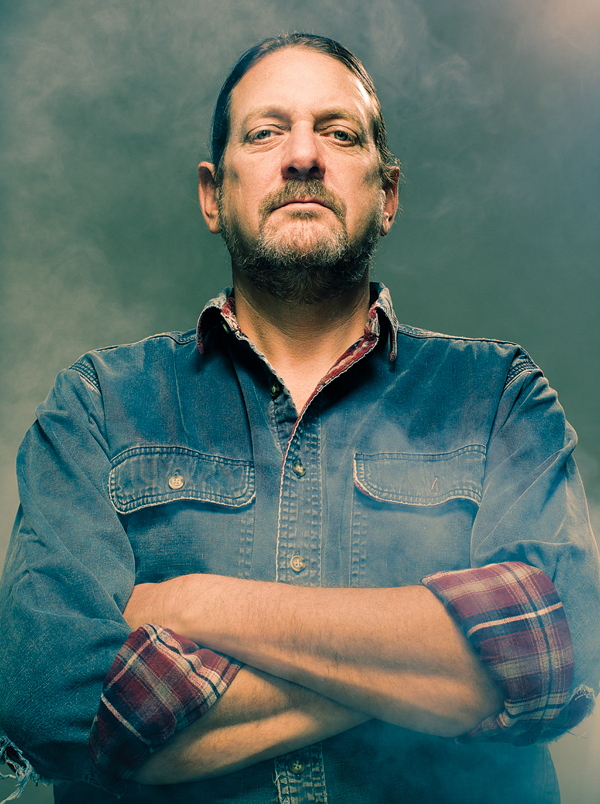Lost in the Weeds
“When legalization happens in one state and the sky doesn’t fall, all the other states are going to say, ‘What are we, idiots?’ “—Bill Downing, treasurer, Massachusetts Cannabis Reform Coalition

Photo by Scott M. Lacey
The first guy I call for some insight on the ballot initiative is Downing, who’s been involved with pro-marijuana groups since the late 1980s. The Massachusetts Cannabis Reform Coalition (MassCann) is the local affiliate of the National Organization for the Reform of Marijuana Laws, and I figured they were behind the initiative. I was wrong. They support the legalization and regulation of marijuana for adult use, but MassCann had no part in drafting the medical-marijuana bill. That work was done by representatives from the ACLU and the Massachusetts Patient Advocacy Alliance. When I finally connect with the writers of the ballot measure, they stop talking to me after I broach the topic of legalization. They aren’t interested in discussing anything beyond giving physicians the right to prescribe pot to their suffering patients. To MassCann, on the other hand, legalization is the whole point of the movement.
In early July, I pull up to Downing’s house in Reading. He comes out to greet me dressed in loose khakis, his mini ponytail tucked into the collar of his shirt. We sit by his pool, which is alive with tadpoles—he says he hasn’t cleaned it for the season yet—and talk pot. He’s married and has two teenage boys, but few people in the state have a longer history of pushing a pro-marijuana agenda than he does. MassCann has made slow progress over the years, including increasing the size of its annual Freedom Rally in September—which features “civil disobedience” smoke-ins on the Common—but things are now picking up speed. Downing feels like his time is finally coming.
If Massachusetts voters approve Question 3 on the November ballot, the state will permit up to 35 nonprofit “medical marijuana treatment centers” around the state. Those centers will be allowed to sell a 60-day supply of pot to anyone with a doctor’s note that’s been approved by the Massachusetts Department of Public Health. (The ballot question leaves it to the Department of Public Health to define what constitutes a 60-day supply.) Patients with a financial hardship or without access to a dispensary may also be allowed to grow an equivalent amount of pot.
And to discourage doctors from running the kinds of prescription mills that popped up in Colorado, the would-be law requires that a physician and a patient have a “bona fide” relationship. The state would also be authorized to conduct criminal-background checks on all dispensary agents, and it would be a misdemeanor to defraud the system—a felony if such fraud is for trafficking, sale, or distribution. Finally, all marijuana would need to be grown in an enclosed, locked facility to prevent theft. These are the signature Massachusetts measures meant to keep legal herb from ending up on the street. I have my doubts.
Keeping an eye on home growers, especially if there are a lot of them, isn’t really feasible. Even quantifying the total amount of pot grown is likely to be difficult, since different plants and growing techniques yield different results.
To Downing, though, the real concern is the black market that exists under our current drug laws, which is why he’s so pleased with the medical initiative. It’s the money from illegal sales, he tells me, that “goes into all those evil, evil things that we associate with international crime syndicates. So by taking all that marijuana out of the black market, we’re starving the crime syndicate of that money.”
That may be true, but I suspect that the real reason Downing likes the initiative is its broader implications. He believes that the state-by-state adoption of medical-marijuana laws is pushing the country toward a tipping point. If eight more states approve the laws, a majority will have done so. The government, he believes, will have to remove the federal ban on medical pot or risk looking foolish. And that will set the stage for MassCann’s true objective: legalization—the stuff of reggae songs and T-shirts on college campuses. Downing brings up the full-scale legalization bills in Colorado, Oregon, and Washington, saying, “If a state gets legalization, you know, everybody recognizes that the emperor is naked. When legalization happens in one state and the sky doesn’t fall, all the other states are going to say, ‘What are we, idiots?’”